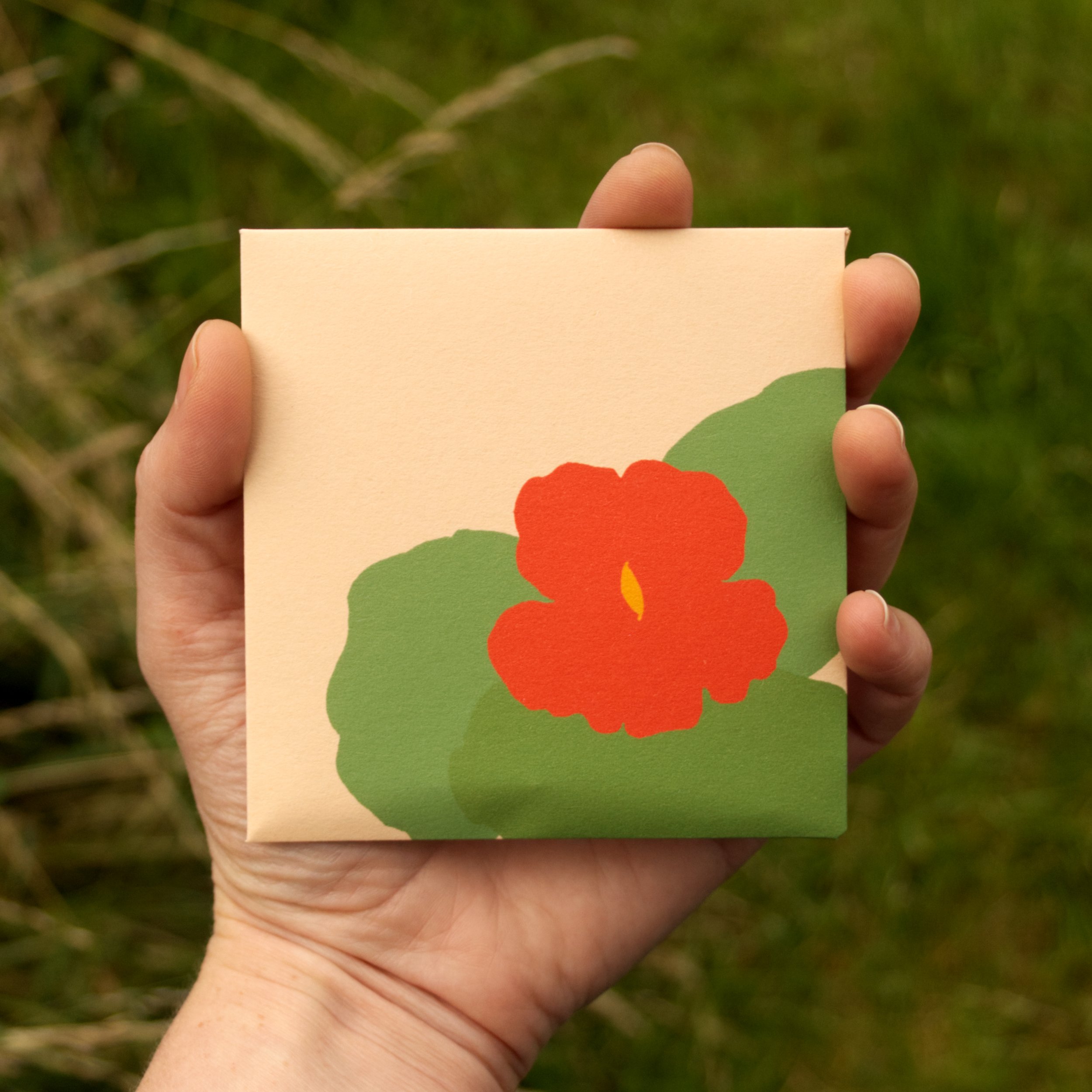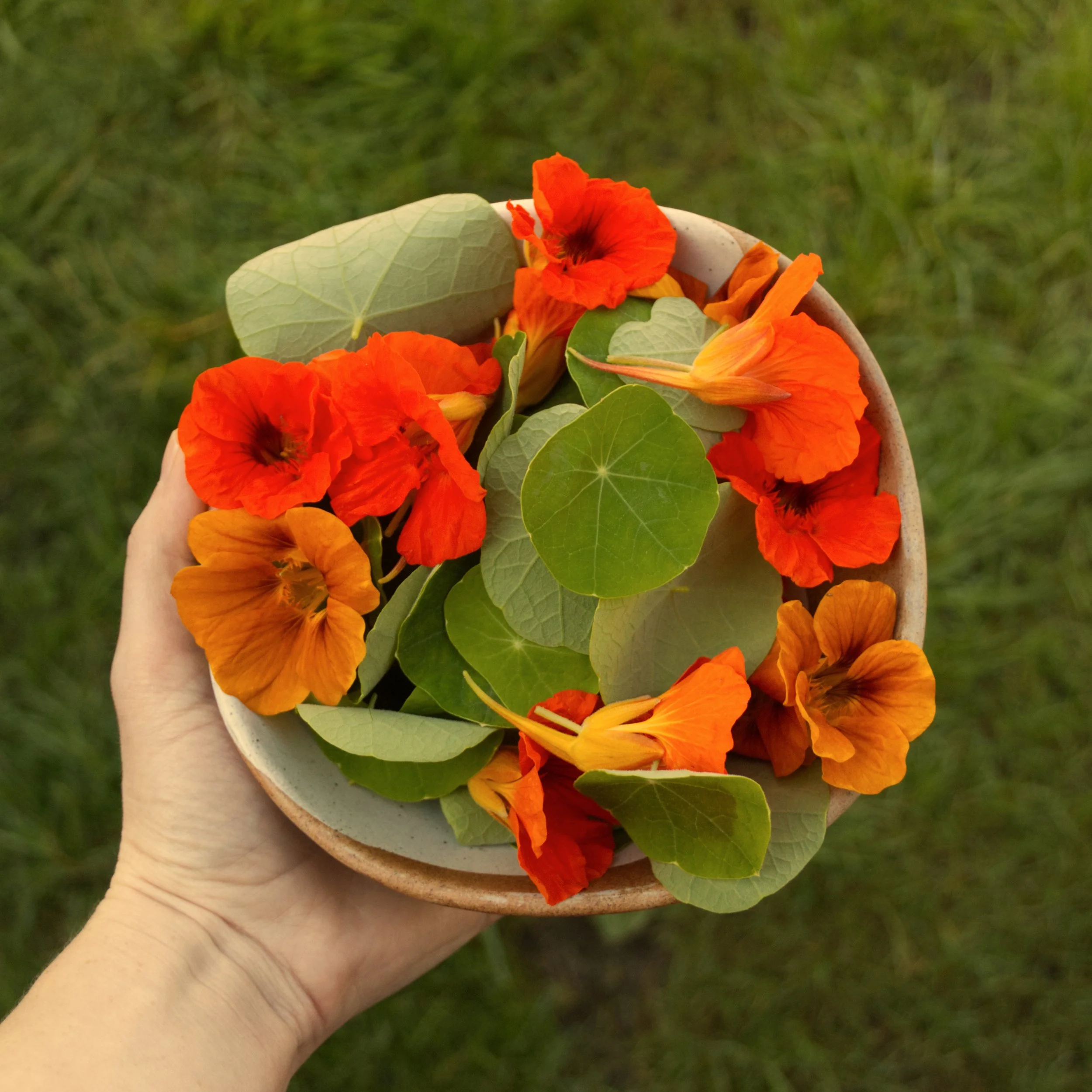 Image 1 of 7
Image 1 of 7

 Image 2 of 7
Image 2 of 7

 Image 3 of 7
Image 3 of 7

 Image 4 of 7
Image 4 of 7

 Image 5 of 7
Image 5 of 7

 Image 6 of 7
Image 6 of 7

 Image 7 of 7
Image 7 of 7








meri a mari - welsh botanical greetings card with nasturtium seeds
Blank botanical card with nasturtium seeds to sow and grow, featuring Welsh, English and Latin plant names.
Native to South America, nasturtiums were an important plant in ancient Incan societies in Peru. Brought to Europe by Spanish botanist Nicolás Monardes in the 16th century, the plant became a popular addition to European cultivated gardens. Historically associated with victory, flowers were given to Roman soldiers before battle, and woven into bright floral cloaks to adorn armour.
The Welsh meri a mari roughly translates to ‘berries and Mary’, possibly referring to Mary mother of Jesus, and the large, round, berry-like seeds the plant produces. Capan cornicyll means ‘lapwing’s cap’, as the spur at the base of the flower resembles the long feathery tuft on a lapwing’s head.
Nasturtiums are favoured by bees and the small white/cabbage butterfly, where females will lay eggs onto leaves for the caterpillars to feed on once hatched, before turning into pupae. The flowers, leaves, buds and unripe seeds are all edible and have a strong, mustardy flavour. The flower buds and seed-berries can be pickled in vinegar and make a spicy alternative to capers. The leaves contain vitamin C, iron, as well as antiseptic components, and also exhibit the amazing lotus effect, where water droplets can be rolled around the surface of the leaves which remain completely dry and clean underneath.
Digitally printed onto 270gsm 100% recycled cardstock with a matching envelope. Our seeds are organically grown in Cornwall. Handmade in Pembrokeshire.
Blank botanical card with nasturtium seeds to sow and grow, featuring Welsh, English and Latin plant names.
Native to South America, nasturtiums were an important plant in ancient Incan societies in Peru. Brought to Europe by Spanish botanist Nicolás Monardes in the 16th century, the plant became a popular addition to European cultivated gardens. Historically associated with victory, flowers were given to Roman soldiers before battle, and woven into bright floral cloaks to adorn armour.
The Welsh meri a mari roughly translates to ‘berries and Mary’, possibly referring to Mary mother of Jesus, and the large, round, berry-like seeds the plant produces. Capan cornicyll means ‘lapwing’s cap’, as the spur at the base of the flower resembles the long feathery tuft on a lapwing’s head.
Nasturtiums are favoured by bees and the small white/cabbage butterfly, where females will lay eggs onto leaves for the caterpillars to feed on once hatched, before turning into pupae. The flowers, leaves, buds and unripe seeds are all edible and have a strong, mustardy flavour. The flower buds and seed-berries can be pickled in vinegar and make a spicy alternative to capers. The leaves contain vitamin C, iron, as well as antiseptic components, and also exhibit the amazing lotus effect, where water droplets can be rolled around the surface of the leaves which remain completely dry and clean underneath.
Digitally printed onto 270gsm 100% recycled cardstock with a matching envelope. Our seeds are organically grown in Cornwall. Handmade in Pembrokeshire.
Blank botanical card with nasturtium seeds to sow and grow, featuring Welsh, English and Latin plant names.
Native to South America, nasturtiums were an important plant in ancient Incan societies in Peru. Brought to Europe by Spanish botanist Nicolás Monardes in the 16th century, the plant became a popular addition to European cultivated gardens. Historically associated with victory, flowers were given to Roman soldiers before battle, and woven into bright floral cloaks to adorn armour.
The Welsh meri a mari roughly translates to ‘berries and Mary’, possibly referring to Mary mother of Jesus, and the large, round, berry-like seeds the plant produces. Capan cornicyll means ‘lapwing’s cap’, as the spur at the base of the flower resembles the long feathery tuft on a lapwing’s head.
Nasturtiums are favoured by bees and the small white/cabbage butterfly, where females will lay eggs onto leaves for the caterpillars to feed on once hatched, before turning into pupae. The flowers, leaves, buds and unripe seeds are all edible and have a strong, mustardy flavour. The flower buds and seed-berries can be pickled in vinegar and make a spicy alternative to capers. The leaves contain vitamin C, iron, as well as antiseptic components, and also exhibit the amazing lotus effect, where water droplets can be rolled around the surface of the leaves which remain completely dry and clean underneath.
Digitally printed onto 270gsm 100% recycled cardstock with a matching envelope. Our seeds are organically grown in Cornwall. Handmade in Pembrokeshire.